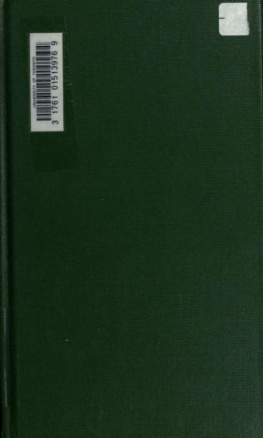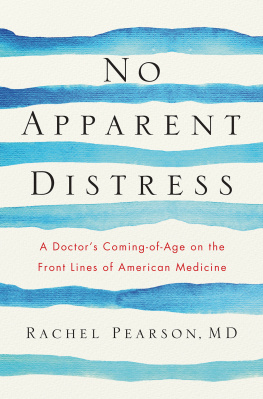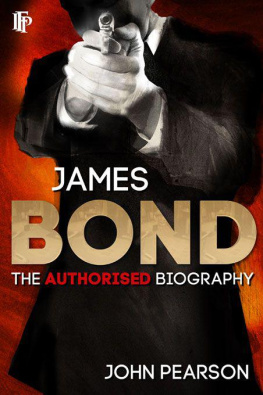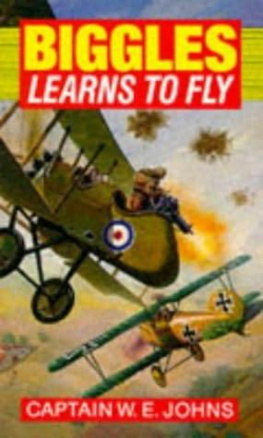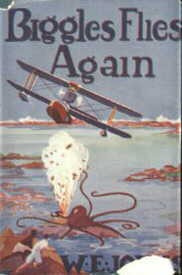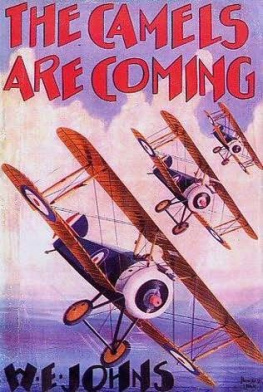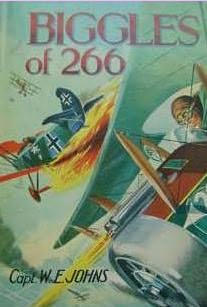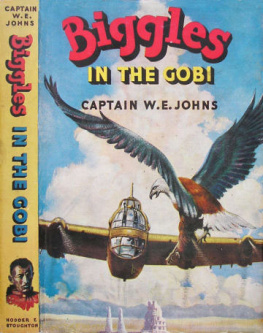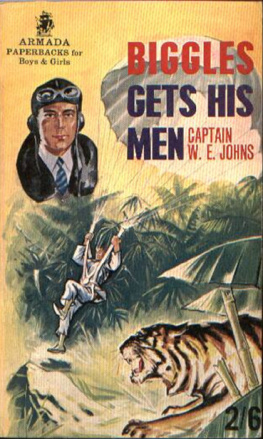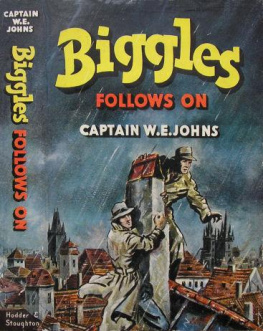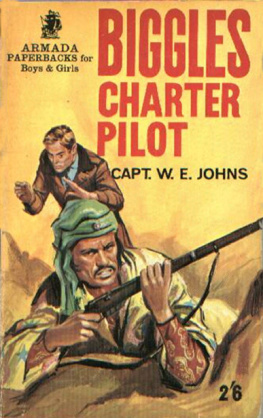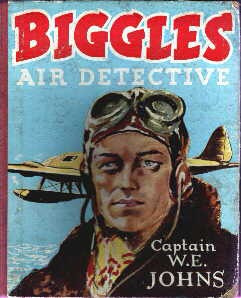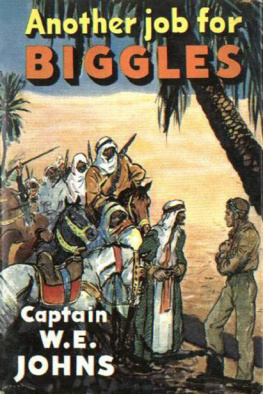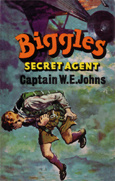BIGGLES
The Authorized
Biography
JOHN PEARSON

This electronic edition published in 2011 by Bloomsbury Reader
Bloomsbury Reader is a division of Bloomsbury Publishing Plc, 50 Bedford Square, London
WC1B 3DP
Copyright 1978 by John Pearson
First published by Sidgwick and Jackson Ltd
The moral right of author has been asserted
All rights reserved
You may not copy, distribute, transmit, reproduce or otherwise make available this publication
(or any part of it) in any form, or by any means (including without limitation electronic, digital,
optical, mechanical, photocopying, printing, recording or otherwise), without the prior written
permission of the publisher. Any person who does any unauthorised act in relation to this
publication may be liable to criminal prosecution and civil claims for damages
ISBN: 9781448208005
eISBN: 9781448207763
Visit www.bloomsburyreader.com to find out more about our authors and their books
You will find extracts, author interviews, author events and you can sign up for
newsletters to be the first to hear about our latest releases and special offers
Contents
At first we knew him simply as the new tenant of Ferndene Cottage, an unlovely little red-brick house standing four-square behind its overgrown privet hedge on the far side of the London Road from where we live.
The cottage had stood empty for some time, so we were naturally inquisitive about the new arrival, but it was some time before we learned the identity of the red-faced, rather portly little man with the leather-patched tweed jacket who would emerge from Ferndene Cottage at 8.30 punctually each morning, taking his pug-dog for a walk. In Camberley we havea lot of pug-dogs and a lot of retired army people. They seem to go together, so we assumed our newest neighbour with his jaunty walk and weather-beaten countenance must be one of them.
It was the vicar, our walking social register, who finally put us right.
And how are you getting on with our celebrated new neighbour? he asked my wife.
She must have looked surprised, for he went on, Wing-Commander Bigglesworth. Your husband must have read of his adventures when he was a boy you know, Biggles, the great schoolboy hero of the R.A.F. Im quite determined to persuade him to open the village fte. He should be quite a draw.
But Biggles did not open the vicars fte nor anything else in Camberley that year. Instead, he seemed distinctly anxious to keep himself to himself, and while we were all quite proud to have a genuine celebrity in our midst, we soon accepted him as a recluse, our interest waned, and that was that. And then, one wet November evening, I was walking home and passed him near the church. He was carrying a twelve-bore shotgun and had half a dozen pigeons slung across his shoulder.
Good shooting, Wing-Commander! I called out. At first he seemed surprised to be addressed like this, but he stopped and instantly eased up when I said something about how hard I always found it to shoot wood-pigeon.
Simple enough, when youve got the knack, he said. I only do it to keep my eye in, dont you know? There was a slightly awkward pause and he added, I suppose your wife couldnt make use of them, could she? My housekeeper cant be bothered with them, and they generally end up in the dustbin.
I thanked him, but on the condition that he came and helped us eat them. He seemed quite pleased at the idea and two nights later he arrived for dinner. And so began a friendship that endured until his death, some three years later.
The truth, as I soon discovered, was that around this time he had grown bored with his retirement and was really rather lonely. He had retired to the country on his doctors orders, but it didnt really suit him. He owned an elderly MG, in which he would drive to London once or twice a week. As well as shooting, he would fish a little. Used to do it as a boy, he told us. Now that I cant play golf it keeps me out of mischief I suppose.
I couldnt think what mischief he was likely to get up to certainly not with his old housekeeper, Mrs Roberts. She was a frail-looking, gap-toothed, rather ghostly lady. When my wife got to know her she would often grumble on about the Wing-Commanders habits his untidiness, his fussiness about his food, his cigarettes and his uncertain temper. But with us he was always kindness itself and soon became a regular visitor.
Although he often brought us pigeon and partridges and pheasants, now that the season had begun what he really liked to eat was steak, and what my wife called nursery food fishcakes and shepherds pie and sausages and mash. His favourite food of all was toad-in-the-hole, particularly the crispy bits around the edges of the dish. Apart from a couple of pink gins before dinner, he would drink very little. What he apparently enjoyed most of all in life now was talking, particularly with the children present. At first I never knew quite how many of his tales were true and how much was pure fantasy, but he was certainly a splendid raconteur when in the mood, and after dinner he would sit for hours, smoking his disgusting pipe and reminiscing about his life. Whenever this occurred it was impossible to get the children off to bed.
All this was rather strange, for to the world at large, Biggles as I have to call him remained secretive to a degree about his life. I remember seeing him one morning chasing two news reporters down the garden path of Ferndene Cottage with his twelve-bore. All they had wanted was an interview to mark the fiftieth anniversary of the founding of his legendary old squadron, No. 266 of the Royal Flying Corps, but for Biggles it had been unforgivable of them to have tried to beard him in retirement in this way.
Gutter journalists, he called them, when he told us all about them later, prying into peoples private lives. Theyd all be horsewhipped if I had my way with them. But he said this with a twinkle in his eye, and certainly exhibited no inhibitions about telling us the details of his private life quite the contrary.
He enjoyed these evening reminiscences by the fire; they offered him at least some relief from the boredom of his life in Camberley. His present state of health depressed him, for like many very active men who had always taken perfect health for granted, Biggles found it hard to cope with ill health when it came. His back used to trouble him a lot and he was slightly diabetic. His eyes bothered him as well.
Doing my best to fight off the Grim Reaper! was the invariable reply if one asked how he was but once he was embarked upon his stories of the past he seemed to forget all his present troubles. He even managed to look different, for as he talked he was re-living scenes from a life he had obviously enjoyed. His hazel eyes used to gleam and he had an air of such gusto and absorption in his tale, that it was just as if a younger, more adventurous self had taken over.
As far as we could judge, Biggles held little back. He frequently referred to his outlandish family, his childhood in India, his schooldays and his earliest experiences in the air. My children were avid readers of the Biggles books, and would interrogate him mercilessly, making him go over particular adventures, asking for extra details and making him repeat the circumstances of some favourite incident. And so, from these winter sessions round the fire, I learned the outlines of the story of his life. Much was familiar already from the writings of Captain W. E. Johns, and this I have tended to compress or refer to in passing in the narrative that follows. But there was much that seemed totally unknown and it is this completely new material that I have concentrated on in my attempt to write the biography of this most remarkable and kindly man of action.


